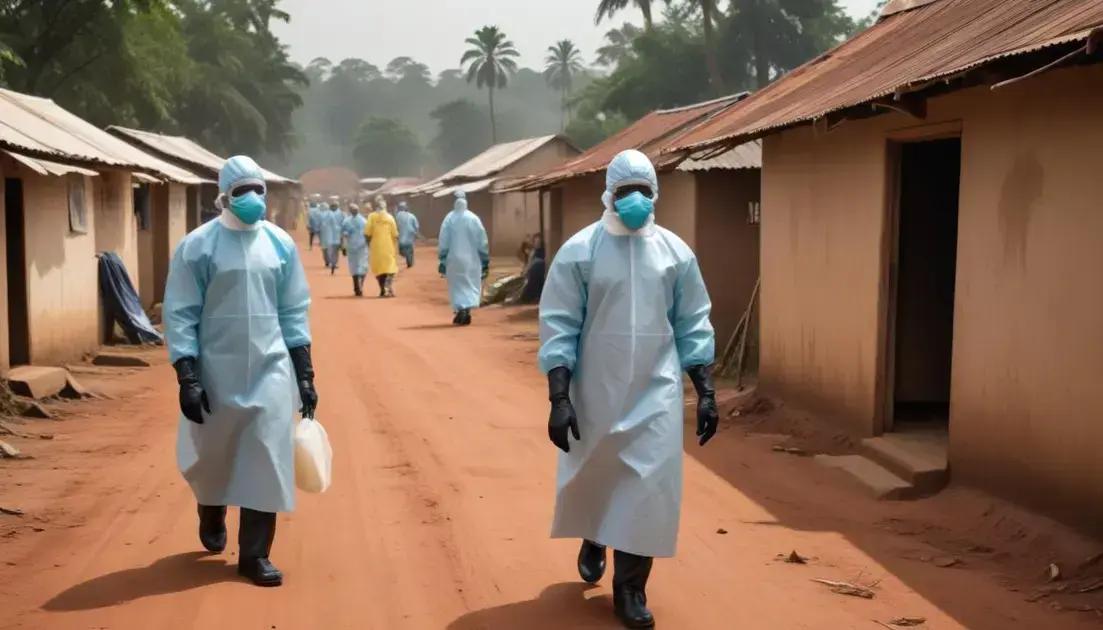
Ebola: The Epidemic that Terrorized West Africa
The Ebola epidemic significantly impacted West African countries, causing loss of life and crippling healthcare systems. Key lessons include the importance of rapid response, strengthening healthcare infrastructure, and fostering global cooperation. Effective communication and public education about health risks are vital for future prevention. The crisis highlighted the need for empathy towards affected communities and the necessity of preparing for potential health threats to protect lives and improve healthcare delivery.
The Ebola epidemic that gripped West Africa created a health crisis like no other. With its devastating impact on lives and healthcare systems, this outbreak serves as a crucial reminder of the importance of preparedness in global health.
Introduction to the Ebola epidemic
The Ebola outbreak began in 2014 and quickly spread across West Africa. Countries like Guinea, Liberia, and Sierra Leone faced the biggest challenges. Ebola spreads through direct contact with the bodily fluids of infected people. This includes blood, saliva, and sweat.
Many communities were not prepared for such an outbreak. They lacked proper medical facilities and resources to fight the virus. Healthcare workers became heroes, risking their lives to treat patients and stop the spread.
During this time, fear and misunderstanding about Ebola grew. Many people didn’t know how the virus worked or how to protect themselves. This led to panic in several regions.
Governments and organizations around the world stepped in to help. They sent doctors, nurses, and supplies to affected areas. The global response was crucial in controlling the outbreak and saving lives.
As the situation improved, lessons were learned. The importance of quick action and good communication became clear. Disease outbreaks require strong systems to manage health risks and protect communities.
Impact on West African countries
The Ebola outbreak had a massive impact on West Africa. It affected countries like Guinea, Liberia, and Sierra Leone the hardest. The health crisis left thousands of families grieving lost loved ones. Many communities faced fear and uncertainty as the virus spread rapidly.
Healthcare systems struggled to cope. Hospitals became overwhelmed, and many health workers got infected while trying to help others. The fear of Ebola kept people away from medical facilities, making it harder for them to get care.
Economically, the outbreak caused significant damage. Trade slowed down, and many local businesses closed. Farmers couldn’t sell their crops, leading to food shortages. This added to the struggles faced by families trying to make ends meet.
Education also took a hit. Schools closed to prevent the spread of the virus. Children missed months of learning, which set back their education. Parents worried about their kids falling behind.
Finally, the social fabric of communities changed. Trust in local health systems was shaken. Many people turned to myths and rumors instead of reliable information. This created confusion and fear in the fight against Ebola.
Global health response and challenges
The global health response to the Ebola outbreak was swift but faced many challenges. Organizations like the World Health Organization (WHO) and Médecins Sans Frontières (Doctors Without Borders) rushed to help affected countries. They sent teams of healthcare workers and supplies to fight the disease.
Despite their efforts, the response had problems. Many regions had poor infrastructure. Roads were damaged, making it hard to reach remote areas. This delayed aid and allowed the virus to spread further.
Another challenge was misinformation. Many people believed myths about Ebola, which made it hard to share accurate information. This led to fear and distrust towards healthcare workers, which complicated their efforts to treat patients.
Healthcare systems were also strained. Hospitals were overwhelmed with patients. Staff shortages and the risk of infection meant many workers couldn’t perform their duties effectively. Protecting healthcare workers was vital to sustain the response.
Coordination among international agencies was crucial. Countries had to work together to share resources and information. Learning from past mistakes helped improve strategies. For example, effective communication became essential to educate communities on prevention.
Lessons learned from the outbreak
The Ebola outbreak taught important lessons for handling health crises. One key lesson is the need for quick action. When the outbreak began, rapid responses saved lives. Countries must be ready to act fast when facing a health emergency.
Communication is another crucial factor. Sharing reliable information with communities helped reduce fear. People need to understand how to protect themselves from viruses. Misinformation can delay healthcare efforts.
Collaboration among countries and organizations is vital. The outbreak showed that working together improves responses. Resources and information can be shared better, which helps affected areas recover quicker.
Healthcare infrastructure must be strengthened. Many regions lacked basic medical facilities. Investing in healthcare systems can make a big difference, especially in remote areas.
Finally, training healthcare workers is essential. They are on the front lines during health crises. Providing them with the right tools and knowledge helps save lives and builds trust in health systems.
Conclusion and future considerations
Addressing the Ebola outbreak helps shape future health strategies. It’s clear that every health crisis teaches valuable lessons. For instance, communities must learn to react quickly to prevent outbreaks from spreading.
Healthcare systems need investment. Strong healthcare infrastructure is vital for managing risks. This means building more hospitals, training health workers, and ensuring everyone can access care.
Global cooperation is essential. Countries must share knowledge and resources. This collaboration helps us prepare for future health challenges, making response efforts more effective.
Public awareness campaigns are important too. Educating communities about health risks and prevention methods keeps everyone safe. Clear and honest communication builds trust with public health officials.
Finally, showing empathy and support for affected regions truly matters. Recognizing the human impact of outbreaks allows us to unite and strengthen our response plans together.
Conclusion
In conclusion, understanding the impact of the Ebola outbreak helps us prepare for future health crises. The lessons we’ve learned stress the importance of quick responses, strong healthcare systems, and global cooperation. When countries unite and share resources, we can tackle health threats more effectively.
Investing in education and public awareness is also crucial. Teaching communities about health risks and prevention builds trust and keeps everyone safer. Empathy towards affected regions creates a supportive environment that encourages recovery.
As we move forward, applying these lessons will help protect lives and improve our health systems. Together, we can face future challenges with greater confidence and resilience.


